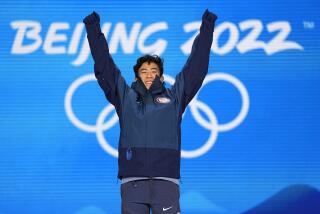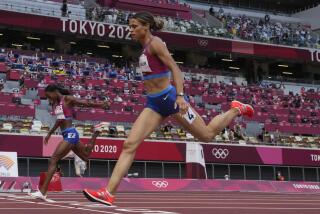Ring in the Old? L.A. Will Bid for 2016 Summer Games
Los Angeles organizers say they will announce plans today to bid for the 2016 Olympics, a campaign that, if successful, would give the city its third Summer Games and the United States its first in 20 years.
Los Angeles was the scene of the Summer Olympics in 1932 and 1984; no other U.S. city has served as host more than once. The last American city to stage the Summer Olympics was Atlanta in 1996 -- a 20-year gap that some experts say could work in the United States’ favor when it puts forward its choice for 2016.
The International Olympic Committee will make its selection in 2009. Los Angeles is the first U.S. city to formally enter the competition to become the U.S. Olympic Committee’s nominee, though Chicago, San Francisco and Washington are also possible contenders. New York, which sought the 2012 bid, is not expected to try again so soon.
The USOC is expected to name its bid city by 2007.
The Los Angeles region’s upsides include a tradition of Olympic involvement, the weather, a slew of existing facilities and a model of privately financing the Games that is all but certain to produce a hefty surplus.
A major challenge lies in persuading Olympic leaders to once again give a city its third Summer Games, having chosen two-time host London (in 1908 and 1948) for the 2012 Games -- especially a city where the Games remain a relatively fresh memory for many IOC members.
“We all know the Games would obviously be more modern and have better facilities -- 2016 would be 32 years since 1984,” said Janet Evans, who won five medals, four gold, in swimming at the 1988 and 1992 Games, in Seoul and Barcelona.
“The thing to do is leave an even better legacy than 1984. 1984 inspired me to be an Olympian; I was an Orange County kid. The best part about being an Olympian, about being an Olympic champion, is inspiring others. And there’s no better way to promote the Olympics in L.A. than to inspire kids,” she said, echoing the focus that helped London secure the 2012 bid, the notion of sport as a tool for public health.
The USOC has signaled that it intends to search for a city whose mayor is an internationally capable figure who is eager to sell the bid in the way that British Prime Minister Tony Blair campaigned on London’s behalf.
Mayor Antonio Villaraigosa is due to take center stage at the news conference today announcing the bid. In a telephone interview Tuesday night, he said he was “very excited about this bid.”
“Hosting the Games would be not only great for Los Angeles and the nation, but also a world community that is searching for common ground,” Villaraigosa said.
Barry Sanders, chairman of the Southern California Committee for the Olympic Games, said L.A. organizers understand the need to move past 1932 and 1984 -- even while drawing on the tradition of innovation those Games produced.
The Olympic Village, now a Games mainstay, was pioneered in the 1932 Games.
The 1984 Games, which under the direction of businessman Peter Ueberroth were privately financed and turned a $232.5-million profit, revolutionizing Olympic financing, were also the first to rely on thousands of volunteers; such a force is now considered essential to the mammoth undertaking that is the Summer Games.
“We think the opportunity now is as good as it could ever be for a passionate, enthusiastic city such as ours,” Sanders said.After going to Sydney in 2000 and Athens in 2004 and with plans to go to Beijing in 2008 and London in 2012, the IOC can be expected to give renewed attention to a bid for 2016 from the United States, the IOC’s financial base.
Already, it is clear that the 2016 race will differ from the 2012 campaign in several significant respects.
For one, Rio de Janeiro could emerge as a serious contender. The IOC’s president, Jacques Rogge of Belgium, has been outspoken in his desire to take the Games to Africa or South America; the Games have not been staged on either continent.
The 2007 Pan American Games in Rio figure to serve as a test of Brazilian organizers.
In addition, the USOC has said it intends to exercise increased oversight over the U.S. portion of the race -- and thereafter. The 2012 campaign was marked by behind-the-scenes friction between the USOC and the New York bid team that carried on until only hours before the 2012 vote July 6 in Singapore.
In a letter to be sent today to the USOC, the L.A. committee says, “We respect the responsibility and authority of the [USOC]” and promises “full cooperation.”
The USOC board, now chaired by Ueberroth, is due to meet Saturday in Denver to begin sketching out guidelines for the 2016 race.
Ueberroth has been careful to stress that a Los Angeles bid would not enjoy special status with the USOC simply because of his connections to 1984.
He and the USOC’s chief executive, Jim Scherr, have also made plain that New York would not be the presumed favorite for 2016 simply because it had been the 2012 choice. In part for that reason, New York bid officials have said a 2016 campaign, although possible, remains unlikely.
New York finished fourth in the 2012 voting. Paris finished second, Madrid third, Moscow fifth.
In the past, the USOC anointed a city to carry on from one campaign to another; Salt Lake City, for instance, lost the 1998 Winter Games to Nagano, Japan, but was tabbed to run again for 2002, which it won.
No more. USOC spokesman Darryl Seibel said Tuesday, “It will be a clean slate and we will be starting fresh.”
Full details of the Los Angeles bid are still under development. Much, however, is evident to anyone on the Southern California freeways: Almost all the venues exist now, a considerable sales point in the aftermath of the IOC’s experience in Athens, where a late start delayed construction and pushed up costs. The Greek government now figures the 2004 Games cost $16 billion in infrastructure.
Several of the facilities are new since 1984, including Staples Center in downtown Los Angeles, Arrowhead Pond in Anaheim and the Home Depot Center at the Cal State Dominguez Hills campus in Carson, a massive sports complex that opened in 2003 and includes, among other things, soccer fields, tennis courts and a velodrome.
The 2016 bid will be L.A.’s 13th. The city’s effort for the 2012 Games ended with the USOC indicating it wanted more than existing facilities and making it plain that L.A. officials ought to take a hard look at plans for such facilities as the village, which for 2012 would have been split at USC and UCLA, as it was in 1984.
The 2016 plan will feature a single village. A possibility: new housing units now planned around USC.
Sanders stressed that no site has been selected.
The Home Depot Center, like Staples Center, was developed by AEG, the Los Angeles-based firm backed by Denver billionaire Philip Anschutz. In what could be another significant boost for an L.A. bid, AEG’s connections to the Olympic scene run deep.
The company’s chief operating officer, Scott Blackmun, used to be the USOC’s chief executive. Moreover, AEG is in the midst of a $1-billion investment in redeveloping the huge London structure that used to be called the Millennium Dome, now dubbed “The O2.” It will be the site of gymnastics and basketball in 2012.
In an interview, AEG’s president, Tim Leiweke, who is a vice chairman of the Los Angeles bid committee, said L.A. organizers can take nothing for granted.
“It is critical ... that we rely on our past only as a bright shining moment but not necessarily the reason we deserve [the Games],” he said. “We have to find new salespeople that will capture the attention of decision makers. In prior bids, we didn’t sell. We didn’t think we had to.
“We know now that we have to.”
More to Read
Go beyond the scoreboard
Get the latest on L.A.'s teams in the daily Sports Report newsletter.
You may occasionally receive promotional content from the Los Angeles Times.





